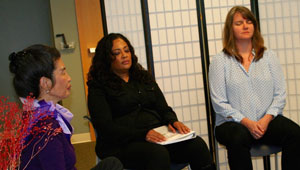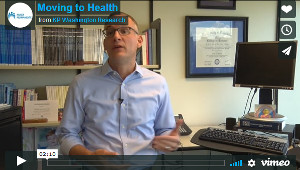Nature contact: A prescription for health and well-being

Dr. Jennifer McClure talks about green spaces, forest bathing, and the health benefits of spending time in nature.
by Jennifer McClure, PhD, Senior Investigator and Director of Research, Faculty & Development, Kaiser Permanente Washington Health Research Institute
Americans have become increasingly disconnected from nature. The majority spend more than 90 percent of their time indoors and much of this time is spent sitting and staring at electronic devices and screens. This is not healthy. When we shut ourselves indoors, glued to our devices, we don’t get the physical activity our bodies need. We also don’t reap the mental and physical benefits that come from spending time outdoors.
Connecting with nature is healthy
Mounting research shows that spending time in nature and green spaces has therapeutic benefits. These include reduced emotional stress, blood pressure, and oxidative stress; improved sleep, mental health, mood, well-being and immune functioning; and reduced overall mortality. Some suggest that connecting with nature also helps us to become more resilient and better able to meet the challenges of every day life, while also promoting exercise, social contact, and a sense of purpose in life.
The therapeutic benefits of nature are so compelling that physicians in the United Kingdom were recently authorized by the National Health Service to prescribe nature walks to patients with chronic disease. In Japan, shinrin-yoku, or forest bathing—the act of spending meditative time in nature and adsorbing it with all of your senses—is a common component of preventive health care and healing. Its popularity has taken root worldwide, including in the United States, along with efforts to increase physicians’ awareness of the benefits of nature contact. Park Rx America, for example, is a U.S-based, non-profit dedicated to reducing the burden of chronic illness and increasing health and happiness by encouraging U.S. health care providers to more routinely prescribe time in nature to their patients.
Practicing what I preach
Several years ago, I committed to making nature contact part of my weekly routine. I now spend time in the woods or mountains every week. It’s a non-negotiable investment that I choose to make in my health and well-being, and for me, it pays off. Spending time in nature either hiking or forest bathing provides me a much-needed counterbalance to my otherwise busy and stressful life.
What’s your nature prescription?
How about you? Are you stressed? Overworked? Feel that you have no time for yourself and need a change? Maybe what you need is a healthy dose of nature! With summer upon us, it’s the perfect time to get out, get some exercise, breath the fresh air, and start investing in your own health.
If you’re looking for some great day hikes, check out these recommendations from our Kaiser Permanente physicians, or check out the Washington Trails Association to find a hike that is right for you.
Need a Discover Pass for access to Washington’s state recreation lands? No problem! Some Washington libraries now allow you to check out a day pass for free. Call your local library for more information.
Can’t hike? Also, not problem! Find a local park and walking trail or a quiet shade tree where you can sit and be mindful. Much of the research on nature contact tells us that the health benefits don’t just come from being active outdoors, the come from just being outdoors.
So, get out this summer. Bathe in the forests, walk in the woods, climb a mountain, or just sit in the grass. Take time to commune with nature. Your body will thank you.
Photo credit: Jennifer McClure
healthy findings blog

Can being accepting and mindful help you stop smoking?
Tobacco remains a public health priority. Jennifer McClure, PhD, discusses her findings comparing ’acceptance and commitment therapy’ to standard care.

Mindfulness meditation eases chronic low back pain
JAMA publishes research by Group Health researchers, comparing mindfulness, cognitive behavioral therapy, and usual care for back pain.

In a funk? Break out with these experiments.
Try something that worked before—or something completely new.
Video

Moving to Health
Where you live can affect your health, and a $2.67-million NIDDK-funded UW/KPWHRI project explores how.


